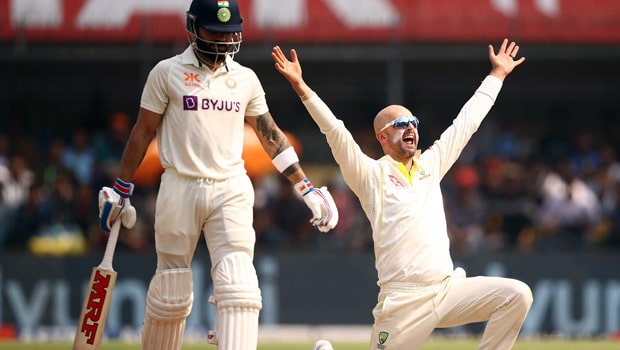India’s request for a sharply-spinning track at Indore’s Holkar Stadium, one that would turn from day one, did not go according to plan. And the result, apart from some bruised egos and more self-doubt inflicted on some struggling top-class Indian batsmen, is that Australia have hit back from two crushing defeats to win a Test match on Indian soil. Only the second by an Australian team in India since 2004, with the previous being the famous Pune victory on a rank turner in 2017.
Which brings us to where India erred in the third Test at Indore. By opting, once again, for a pitch designed to assist their own trio of spinners. On day one, the left-arm spinner Matt Kuhnemann took 5/16 to help bundle India out for 109. On day two, after sensationally losing six wickets for 11 runs in 34 deliveries, Australia roared back into the match by bowling out India for 163, this time with Nathan Lyon taking eight wickets.
That left the visiting team a target of just 76, which they knocked off before lunch on the third day. This win is only Australia’s third in India in their last 46 Test matches, and second in 18 matches here since 2004, during which time they have lost 13. While Australia cannot win the Border Gavaskar Trophy, they will go to Ahmedabad hopeful of at least drawing the series at 2-2, which would be their best result on Indian soil in 19 years.
Up 2-0 in the series, having retained the coveted Border Gavaskar Trophy for the fourth successive series, but with enough struggling batsmen to fill up a poker den, what did India hope to achieve by requesting a rank turner in Indore? Yes, this template has worked for a long time and only one team – Australia in 2017 – had won a Test match in such conditions since 2012, but when the management was aware of how difficult batting at the Holkar Stadium was going to be, what did they expect their own batsmen to achieve? The same batsmen who have struggled against spin for years?
Allow me to share some statistics with you. Since the start of 2021, in Test matches played in India, there are enough examples of quality batsmen struggling to score at home. In the past two years, across 16 Test innings in India, Virat Kohli has averaged 25. Cheteshwar Pujara, from 15 innings at home, has averaged 23.28. Shubman Gill, who replaced an out of form KL Rahul for the Indore match, has an average of 24.08 after 13 innings at home. Rahul, albeit in just three innings and all in this series, averaged 12.66. And Ajinkya Rahane, who the team has moved on from, had an average of 18.87 from eight innings in India before he was dropped.
Kohli, once the best batsman in the world, has a Test batting average of 20.61 from his last 14 innings, home and away. His scores in this period have been 45, 23, 13, 11, 20, 1, 19*, 24, 1, 12, 44, 20, 22 and 13. Kohli has, of course, earned the right to keep playing Test cricket, but why would the Indian want to put a man who has not managed a Test hundred since November 2019 through a torrid time?
Kohli has fallen to the rookie offspinner Toddy Murphy thrice in this series and twice to Kuhnemann’s left-arm spin. Murphy and Kuhnemann made their Test debuts in this BGT and are three and two matches old, respectively. Kohli has looked good in spurts but his judgement of whether to play forward or back to three aggressive spinners has left him short of confidence and, on the basis of his reaction to being adjudged lbw in the second innings in Indore when he went back to a short ball from Kuhnemann, very irritated with the world.
How does the team management expect Kohli, Rahul and Pujara to find form in such conditions? Forget about finding form in the shape of fifties, how can batsmen survive on such surfaces? The way that Rohit Sharma charged at Lyon in the sixth over of the Indore match suggests that he found it better to attack and get out rather than hang around and see the ball fizz and scoot. Ditto for Gill in India’s second innings, with a horrible shot to match his captain’s recklessness.
Would it have hurt India to ask for a more batting-friendlier surface for this match? By once again going for a dry surface that started to crumble from day one, India not only put their own batsmen under more pressure but allowed Australia’s firm of Lyon, Murphy and Kuhnemann to have a bigger say in the contest than in the previous two matches. Rohit Sharma can rock up to a press conference and say that this is the kind of track that puts India in the best position to win and that their batsmen will have to show better application in Ahmedabad, but it is tough to shake the feeling that this was a loss India could have avoided.
So, what can we expect from the Ahmedabad Test? For starters, talk of preparing a green top should be consigned to the rubbish bin because that will not help India at all, even if they were seriously thinking before the Indore match that it would be good practice for the WTC final at The Oval. What Rohit and head coach Rahul Dravid need to now do is ask for a fair track, on which their batsmen can score some much-needed runs.
The series, spanning three Test matches so far, has not lasted nine days. India surrendered 17 wickets in Indore to spin. Rohit and Dravid and the team management need to realise, if they do not already, that India have a very good chance at winning Tests at home on tracks that start to deteriorate as the matches go on. That is, to start turning sharply out of the rough from day three. Three-day finishes can be thrilling, no doubt, but when they also damage the credibility and confidence of India’s own players, there is little to be gained.


























